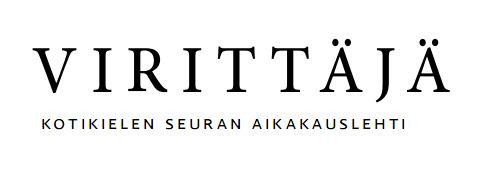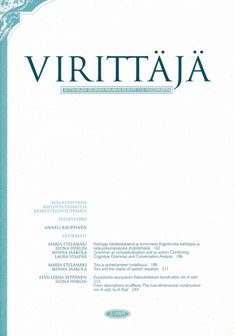Tota ja puhetilanteen todellisuus [Tota and the reality of speech situation]
Abstrakti
Abstract
This article examines the particle tota (~ ‘well’, 'uhm') from two perspectives: the authors first use the method of conversation analysis to examine the meaning of tota in spoken interaction and then describe the meaning within the framework of cognitive grammar. Additionally, the authors consider the possibility that the meaning of the particle tota is motivated by its root demonstrative tuo (~ ‘that’) and the partitive case. This study belongs to the fields of cognitive grammar and interactional linguistics. The data consist of ten hours of audio and video recorded conversations.
The particle tota is examined in a variety of syntactical and sequential positions, and it appears to be highly flexible. It appears most commonly within a turn, but can also appear at the end of a turn and can even constitute an entire turn by itself. The authors posit that examples in which the tota particle either forms an entire turn or comes at the end of a turn are by no means one-off incidences or exceptions to the rule. The particle tota is not always used by the speakers for keeping the turn to themselves, but is also used in situations where the question of who will be the next speaker is genuinely open.
In the authors’ analysis the schematic meaning of the particle tota is to express that some aspect of the currently on-going action is still open. This notion of openness recurs from one context to another, while the syntactical and sequential placement of the particle specifies what aspect of the action will be interpreted as open: for instance, the roles of the speaker and the recipient(s) in the participant framework; the up-coming action; or the formulation of the up-coming expression, and therefore also the up-coming action.
As their starting point, the authors take the central idea of cognitive grammar that linguistic meaning can be understood as conceptualisations. Because the particle tota is an index, i.e. a word whose function is to organise a given speech situation, examining it opens up a new set of considerations in cognitive grammar. The authors consider the ways in which a speech situation is conceptualised in language and the ways in which these conceptualisations could be described within the framework of cognitive grammar.
The authors make use of Langacker’s description of the dynamics and evolution of reality. The article presents a model in which the particle tota profiles a relation between two moments of a speech situation: the current, on-going one and the approaching one. The present moment of the speech situation acts as a trajector, while the approaching moment – or, more specifically, the selection of potential actions opening up from the present moment – is seen as the landmark. According to this model, the interpretation of the current moment of a speech situation is only determined once the nature of the following moment has been realised. The model thus follows the idea familiar from conversation analysis: the interpretation of a turn-at-talk is realised in the speech that follows it.
The article considers what can be interpreted as being part of the meaning of a linguistic unit, while relating to each other the ways in which meaning is understood in conversation analysis, linguistic anthropology and cognitive linguistics. The article expands upon the theory of cognitive grammar by broadening the understanding and purview of a speech situation. Central to the authors’ hypothesis is the idea that a speech situation must be considered more dynamic than the view offered by cognitive grammar, and as the product of cooperation. Additionally, the authors open up a discussion of the ways in which the results achieved by using the method of conversation analysis might be depicted more precisely by bringing them into the realms of a unified semantic theory.






